The ties that bind James and Gretel Packer
After a bitter falling out between siblings James and Gretel, we go inside the battle to divide the Packer fortune.
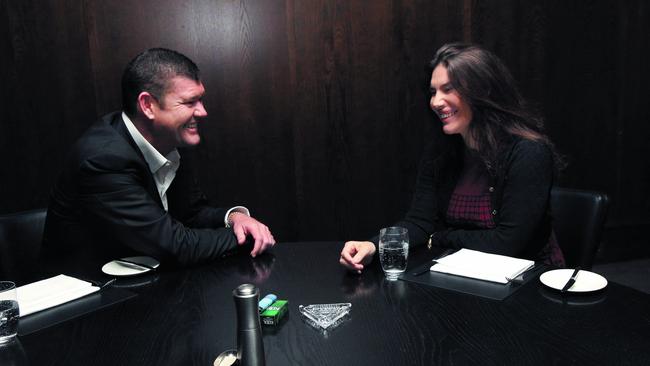
James Packer was doing his best to blend into the bustling crowd at Sydney international airport when he sauntered into the arrivals concourse six days before Christmas 2014.
Dressed in jeans and sporting a pair of designer sunglasses, he waited patiently for his Los Angeles-based ex-wife Erica and their children to emerge from the customs hall after their long Qantas flight from America.
They were home for a Christmas rendezvous with their father and unsurprisingly, after a tip-off, the local paparazzi were there waiting to meet them. After greeting his family with kisses and hugs, as the photographers swirled around them in the airport carpark, James uncharacteristically called out: “Go for it … It’s fine.”
But his happiness was short-lived, with other family matters about to become much more problematic. His older sister, Gretel, had remained very much in the shadows in the nine years since their father’s death. For decades it had been common knowledge that the Packer women played second fiddle to the men of the empire.
That was about to change.
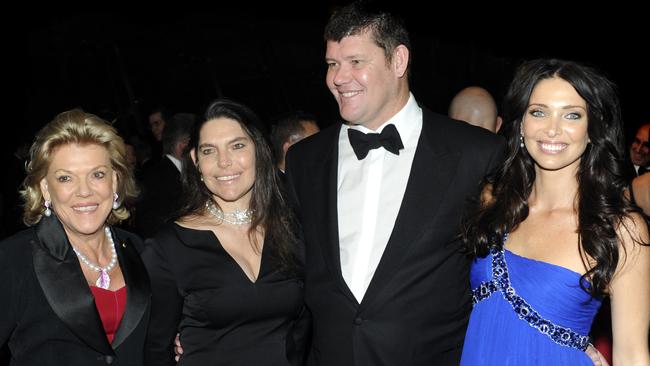
Gretel had watched on from afar as her then Los Angeles-based brother made a big splash in Hollywood with his RatPac film production business and pursued a strange life in Israel. His Israel and Hollywood adventures saw him becoming less involved in the company that held most of the family fortune, Crown Resorts.
In May 2014, Gretel approached Sydney fund manager Will Vicars, the chief investment officer at boutique investment firm Caledonia Investments, to ask him if he would be prepared to broker an agreement with her brother to divide their father’s multi-billion-dollar estate.
Vicars accepted the challenge, having known Gretel since she was five. He had also attended the same school as James, the exclusive Cranbrook in Sydney, leaving two years before him. Despite their age difference, they had become friends at school.
In 2013 James had made headlines when he followed Caledonia’s lead to make a surprise $330 million investment in US property start-up Zillow. James also viewed his Zillow purchase as an act of faith in his friend Vicars.
“It was an awkward process, because I had been representing James on Zillow and his sister had asked me to help her in negotiations with her brother. I had known Gretel for decades and she trusted me,” Vicars now says in his first public comments on the battle between the siblings. At his side in Gretel’s camp for the negotiations was financier Michael Triguboff.
James now says about Gretel’s move: “I think my sister thought RatPac was a folly. I think my sister was probably confused about my time in Israel. Mostly, I think my sister thought she could do better than me in business. And she is doing a very good job of it.”
On Christmas Eve 2014, a package of documents arrived in the hands of James’s lieutenants, Consolidated Press Holdings directors Guy Jalland, Ashok Jacob and Mike Johnston. They carried a series of written demands by Baker McKenzie legal partner Steven Glanz, on behalf of Gretel. She wanted to break up the complex network of trusts that held together the Packer family fortune, alleging that Jalland, Jacob and Johnston had not been behaving in the trustees’ best interests. And she wanted to divide the family fortune. Her brother was livid.
James says the timing of Gretel’s demands could not have been worse. He’d sold all the family’s media businesses — bar a stake in the struggling Ten television network — and reinvested the proceeds in the Crown casino business, whose share price had fallen by one-third during 2014.
But Gretel was in no mood to be fobbed off. She had resolved to tackle her brother head-on, even briefing a London QC to contest her father’s will at London’s Privy Council.
The initial negotiations to divide the family fortune started in early 2015 and took six months. They weren’t pleasant, as James became aggressive towards Gretel and her advisers, believing that his sister was seeking to take advantage of him at his weakest moment. At times, rude emails were exchanged.
In early 2015 his private company CPH borrowed $630m in long-dated money on the US private placement bond market, an alternative to borrowing from traditional banks and public bond markets available to American and foreign companies.
Unlike bank debt, this sort of money is expensive and can’t be paid back early. The money would be used to pay Gretel out.
When an agreement with Gretel was finally documented, a day after James’s 48th birthday on September 8, it was reportedly worth $1.25 billion and included a lump sum worth more than $200m. Gretel and her children also would receive a series of smaller secured cash payments over the coming years and retain a minor residual interest in CPH.
What wasn’t reported at the time was that the deal also provided Gretel with personal guarantees over all of the family’s assets — which she had demanded and which allowed her to sell any asset the family held if her brother defaulted on an obligation — sending a debt-laden James further into panic.
When James and Gretel agreed to pose for a photograph for The Daily Telegraph newspaper at Sydney’s Rockpool restaurant on the evening of October 19, 2015 — two days after news of the settlement of their father’s estate broke — the atmosphere was tense.
While the shots published the next morning showed them smiling at each other, inside they were doing anything but. What the public did not know at the time was that negotiations between the parties had recommenced four weeks earlier, after James decided he wanted to pay his sister early rather than staggering the payments over future years.
He was especially incensed by terms of the deal obliging him to provide Gretel with hundreds of millions of dollars in payments — plus interest — at set dates up to 10 years into the future.
By the middle of October he was deeply frustrated, claiming Gretel was dragging out the negotiations to put him under more pressure. He told Gretel and her advisers at the time that he was being “tortured”. But Gretel was angry that details of the confidential agreement they had struck in the middle of the year and formalised in September had found their way into the media.
She was also wary of James’s blossoming relationship with pop star Mariah Carey.
By Christmas Day, eight months ahead of Gretel’s 50th birthday, a revised $1.25bn deal was agreed, running over a shorter timeframe. Importantly for James, it reduced CPH’s debt to $1.5bn from the $2.3bn it had risen to under the original deal. It had been $1.5bn when his father died in 2005. Gretel reportedly emerged with stakes in Crown and Zillow as well as cash holdings, a residual interest in CPH and ownership of the Packer family’s long- time seaside retreat at Palm Beach north of Sydney. But, tellingly, the recut deal also gave Gretel a one-quarter share of the family’s famed polo estate in the NSW Hunter Valley, Ellerston.
It is over Ellerston that James and his sister really fell out.
As James’s world spiralled out of control in 2016, his obligations to his sister continued to consume him. By the end of the year, he wanted to bring all his future obligations forward and cut the cord between them once and for all.
They met in Aspen on February 17 and 18, 2017, to talk about a resolution for the final tranche of the settlement, but the talks did not go well.
Two important topics were on the table — the future ownership of the Arctic P superyacht and Gretel increasing her interest in Ellerston. The former James agreed to sell to Gretel, who jumped at the opportunity to keep the boat in the family.
But the latter issue remained a sore sticking point.
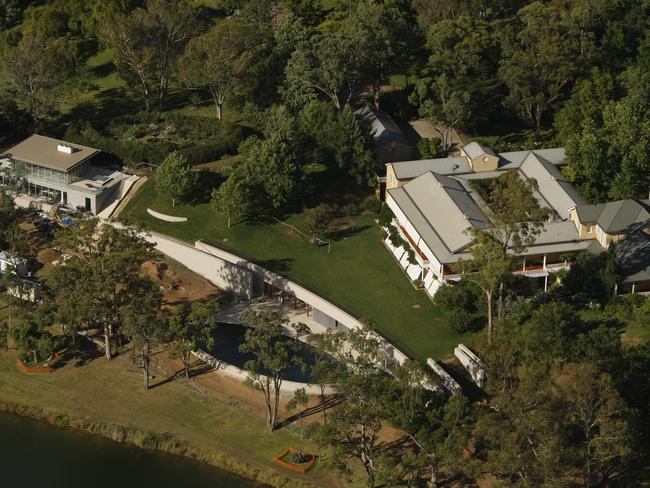
When James made his first visit to Australia in two years for the Crown annual general meeting in Melbourne in October 2017, he and Gretel lunched at the exclusive Koko Japanese restaurant, but remained at odds over the final tranche of their settlement.
Ellerston was again the sticking point. Gretel wanted more of it, but James was resisting. He could not bring himself to give up control of it.
Eventually he relented, agreeing at the end of 2017 that Gretel could eventually move to take full ownership of his and Crown’s 50 per cent stake in Ellerston to give her 100 per cent control of the property. The final settlement also included other liquid assets and property.
“Ellerston is a painful subject for me. Gretel has exclusive rights to it now and in the future will own it 100 per cent. It is where my father is buried. Will (Vicars) and Gretel won it from me,” James now says.
But, he says, allowing Ellerston to be in the deal with his sister was the price he had to pay for reducing his debt and allowing him to keep his half-share of Crown.
“My father once said to me, ‘Son, the problem with the English is they sell their businesses to keep their properties. Sell your properties to keep the business,’ ” he quips.
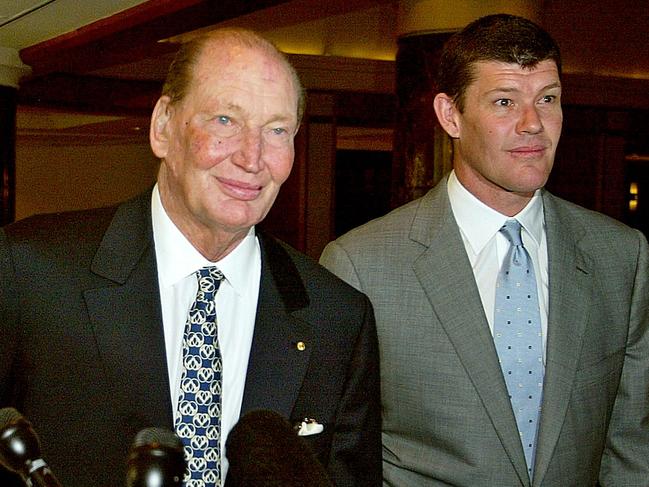
James now says he has deep regrets about his fight with Gretel but wants to make clear that his actions were better than his words.
“Even though we have a framework arrangement that spans many years, I separately arranged, without obligation, to make funds available to Gretel and her children early. To do that put me under financial pressure,” he says.
“I accept at times my words were unforgivable to Gretel and Will. I hope my actions were better than my words.
“I can understand my sister wanting to be bought out. I can understand my sister saying, ‘James, Will Vicars is going to be a better custodian of my money than you.’ I just wish we had all done it better, and I certainly take my share of the blame for that.”
In March this year, remarkably the two siblings agreed to put the past behind them and make peace. Ros Packer is said to have played a key role in the reconciliation when she visited her son in Aspen in the first part of 2018.
“My sister and I have made up. I want to thank David Gonski, Matthew Grounds and my mother for helping both Gretel and I make peace. I’m so happy. I love my sister,” James declares.
Gretel Packer’s first public comments on the battle also appear genuinely heartfelt.
“I love my brother very much and am very happy that he and I have been able to negotiate this settlement,” she says.
“I don’t think there was ever going to be an ‘easy’ time for us to do this and it was always, more likely than not, going to be difficult. The short-term easier option would have been to leave it for our six children to work out … and that would have been unfair to them and lazy of us.
“The fact that we didn’t take that route is something I think we should both be proud of.”
After a nasty falling-out with Vicars during the negotiations, James says he has also agreed to make peace with a man he now describes as a “formidable negotiator”. “Will Vicars is a better steward of my sister’s money than I am,” he says.
“(Vicars’) actions and words (in the Gretel negotiations) were better than mine. He out-negotiated me every time. He fought for Gretel on every point right till the end. Gretel couldn’t have had a better adviser and friend taking care of her interests and holding her hand.
“Even when I tried to be generous, Will still fought for a better deal for Gretel, which infuriated me at the time.”
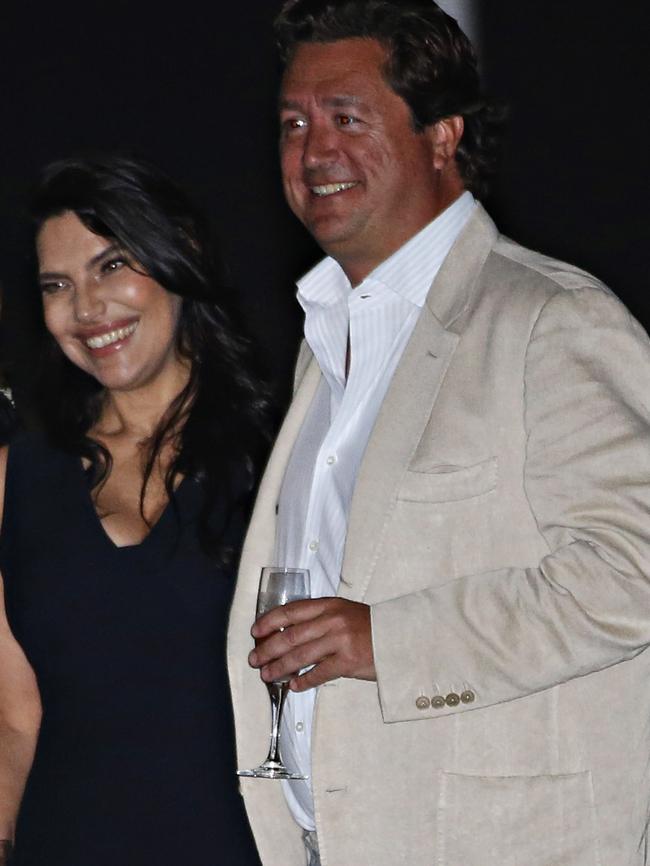
James says Vicars is “a self-made man, whereas I inherited all my money. Will and I have made up. It makes me very, very happy. I’m glad we’ve put all the bad blood behind us.”
Vicars agrees it was a long, drawn-out, emotional process negotiating the division of a whole range of assets that were dear to the hearts of both siblings.
“A lot of things were said that both sides wish were never said, but that’s what can happen in the heat of the moment. That moment went on for quite a while,” he says.
“At the end of the day, everyone is now talking again; the emotion has washed through. The pain of dealing with emotional assets and large sums of money has passed. Both parties are back to being more like brother and sister. James and I are in contact again, and our relationship is back to where we started.”
Whether the peace will now hold remains to be seen, given that the wounds of both run deep. Those closest to them, led by their mother, are praying it does.
Perhaps the regard they share for the man they called Dad — who they both know would surely have wanted them to be close — will continue to draw them back together.
“My father was the largest and most important figure in my life. He was the most remarkable man, and it’s only with time that I more fully realise the breadth and scope of his huge achievements and accomplishments,” James says.
“I believe that Gretel would share some, if not all, of those sentiments. Her actions demonstrate that, with her ownership of so many places and things Dad held dear — from her shareholding in Ellerston, to Arctic, to Palm Beach. I have no doubt Gretel loves and loved my father dearly.”
Edited extract from The Price of Fortune: The Untold Story of Being James Packer, by Damon Kitney (HarperCollins, $45), out on October 22.



